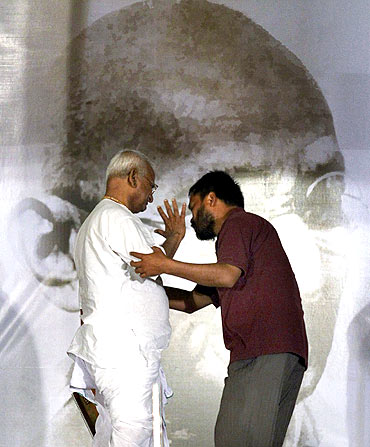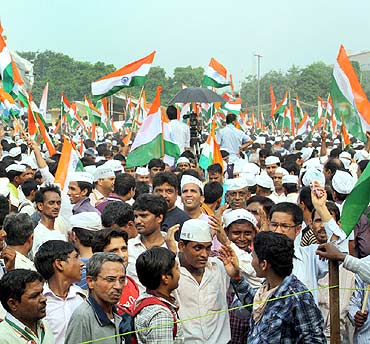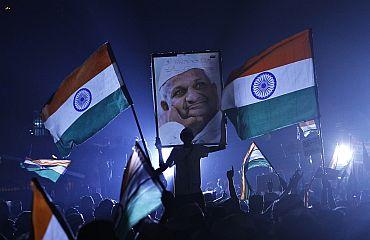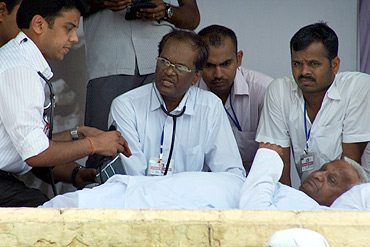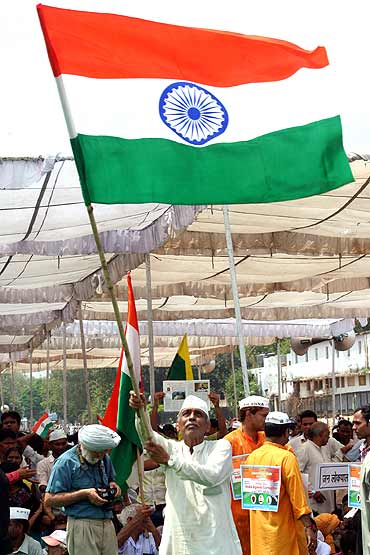 | « Back to article | Print this article |
How Parliament agreed to Anna Hazare's demands
Parliament on Saturday endorsed in principle three key demands made in Anna Hazare's Jan Lokpal after a day-long discussion on the issue, by a broad consensus among various political parties, in an effort to persuade the Gandhian to break his 12-day-old fast.
Both the Lok Sabha and Rajya Sabha adopted by thumping of desks the "sense of the House" to remit the three issues -- citizens' charter, covering lower bureaucracy and appointment of Lokayuktas in states -- to the Parliamentary Standing Committee which is considering the Lokpal Bill.
Originally conceived as a resolution, it was converted into a "sense of the House" after Finance Minister Pranab Mukherjee, chief government negotiator with Team Anna, made a spirited reply to the debate in both the Houses.
Click NEXT to read further...
How Parliament agreed to Anna Hazare's demands
He asked the chair to transmit the "sense of the House" and the entire proceedings of the House to the Standing Committee for its recommendations so that Parliament could consider them at the "appropriate time".
The 'Sense of the House' read out by the finance minister and approved by Parliament reads:
"This House agrees in principle on following issues -- (i) citizen charter, (ii) lower bureaucracy under Lokpal through an appropriate mechanism, and (iii) establishment of Lokayukta in the states.
"And further resolves to forward the proceedings of the House to the Standing Committee on Law and Justice while finalising its report," it said.
Click NEXT to read further...How Parliament agreed to Anna Hazare's demands
There was confusion on whether a resolution was adopted by both the Houses. While Prime Minister Manmmohan Singh called it a resolution in a communication to Hazare, Parliament records would show it as a "sense of the House" which has the effect of a resolution.
The rare action of Parliament came after the Congress and the Bharatiya Janata Party got together in a bid to end the stalemate arising out of Hazare's campaign against corruption.
In the debate in both the Houses, the main Opposition backed government's stand, seeking its help on discussing the three key demands of Hazare.
How Parliament agreed to Anna Hazare's demands
There was unanimity that the Constitution was supreme and Parliamentary procedures' supremacy in law making cannot be questioned.
Though Hazare's commitment on anti-corruption was appreciated, a number of speakers attacked the statements made by his campaign managers on political parties, politicians and sometimes Parliament itself.
Leader of the Opposition in the Rajya Sabha Arun Jaitley said BJP finds considerable merit in Hazare's three demands, including covering the entire bureaucracy and citizens' charter for public grievances under Lokpal and setting up Lokayuktas in states.
How Parliament agreed to Anna Hazare's demands
Maintaining that there should be no conflict with the Constitution and it was the responsibility of MPs to abide by the Constitution, the finance minister asserted in Parliament that legislation is the domain of the Parliament alone.
"Sorry, we cannot go beyond a certain point. Legislation is the domain of legislators. Nobody other than Parliament can make a law. Others can give suggestions. Executive powers are also limited in making laws. Parliament alone can make a law," he said.
